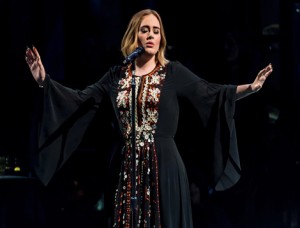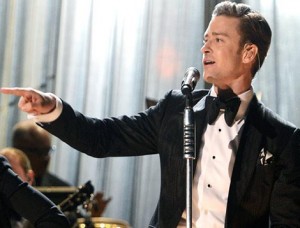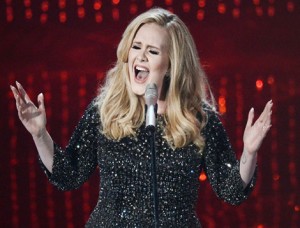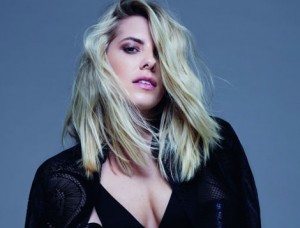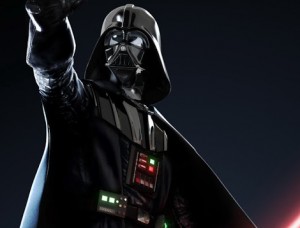THIS WEEK’S MOVIES..A VOW, A WAR & A GHOST
This Means War
OUT FRI 2 MARCH
By Stella Papamichael
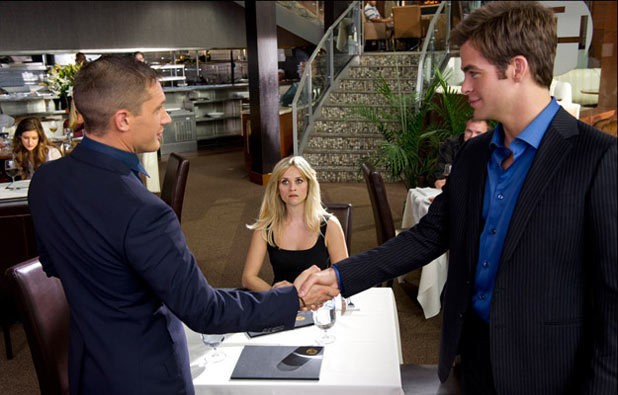
This Means War boldly goes all the way in the romantic action comedy stakes. It is big, dumb and very, very daft. Still, that shouldn’t ruin the enjoyment for dating couples who aren’t looking for anything serious. At least two corners of the featured love triangle – that’s Reese Witherspoonand home-grown talent Tom Hardy – ensure a decent bit of fun and mischief.
Chris Pine, who starred in the 2009 Star Trek redo, brings that macho Kirk quality to the part of FDR, a CIA operative and a rival for the affections of dithering singleton Lauren (Witherspoon). He’s hardly a hero, though, sneakily using surveillance technology to derail a promising internet romance between Lauren and his brother-in-arms Tuck (Hardy).
In contrast to his usually violent roles (Bronson, Warrior), Hardy plays the softer-hearted of the two agents and Pine’s cockiness means that, early on, FDR comes across as the villain of the piece. Soon enough, though, both men are crossing the line with nary a care; invading Lauren’s privacy with hidden cameras, wiretapping and general stalker-like behaviour to try to steal her heart.
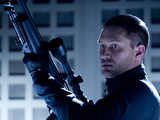
Honestly, no right-minded woman would want to date either of these sociopaths, but Lauren hardly fits that description. On the one hand she’s a bit thick, failing to suss out what’s going on behind her back (literally, both men darting like ninjas in and out of her kitchen) and on the other, she seems flaky and a bit cruel by leading both of them on (unaware that they know each other).
Fortunately, all of this suspect behaviour is played with an impish glint in the eye, not least by director McG whose credits include such glossy, processed cheese asTerminator Salvation and the Charlie’s Angels films. The fact that it’s so outrageous is part of the appeal, making you laugh in sheer disbelief at the lengths these guys will go to.
If you can get over the gross infringement of civil liberties (and even in this day and age, it is utterly implausible), the war waged by Tuck and FDR cleverly works like a magnifying glass on the neuroses often experienced by newly dating couples. McG can’t sustain that ingenuity all the way through, though, and the gags are similarly hit-and-miss.
He often defers to comedienne Chelsea Handler (move over Joan Rivers) who is good for cheap and easy laughs, playing Lauren’s equally cheap and easy friend. She spouts one-liners like Tom Hardy delivers poisoned darts – designed to make your eyes roll and your jaw drop. But going into the final stretch, the action amps up and the laugh count goes down.
The charisma of the actors just about carries it through. It’s especially good to see Hardy tapping into his cheekier side and even Pine begins to seem charming after dropping his defences. As a reward, they all get a happy ending, but after so much deception, this hardly leaves a warm glow. Such a twisted romance might have made a bigger impact if McG was willing to go darker.

………….
Ghost Rider: Spirit of Vengeance
By Ben Rawson-Jones
Were we all asleep while the world clamoured for a Ghost Rider sequel? Obviously. Fortunately Nicolas Cage’s return to the blazing bike saddle is a distinct improvement on its dire predecessor, although that is hardly a blistering recommendation of its quality.
A wise decision was made to reboot the fledgling franchise after just one movie, with Ghost Rider: Spirit of Vengeance treating the content of the original with apparent scorn. Previous events aren’t acknowledged beyond the bare foundation of Johnny Blaze (Cage) selling his soul to The Devil in return for curing his father’s terminal illness – but being given a skeletal vigilante alter ego called Ghost Rider in the process. Even then, the flashback scenes have been reshot.
We join stunt motorcyclist Johnny in a remote location where he has been trying to prevent any transformations into Ghost Rider. However, an energetic monk (Idris Elba) tracks him down and coaxes Johnny into helping him prevent a young boy from falling into The Devil’s (Ciarán Hinds) clutches. Along with the annoying sprog’s mother (The American‘s luscious Violante Placido), they hit the road and encounter an increasingly ineffectual procession of battles before an anti-climactic ending that’s bereft of originality.
The movie’s best material can be found in the movie’s first half, which features a trademark sequence of Cage flipping out and a visual immediacy courtesy of the dynamic handheld camerawork by Crank helmers Mark Neveldine and Brian Taylor. But the script soon runs out of ideas, leading to some dismal set pieces and unsatisfactory narrative developments in the latter stages.
The performances from Cage, Elba and Placido all find the right tone for the subject matter, with the actors working hard to produce a sense of urgency by steering clear of melodrama. There’s the usual comforting sense of fun to watch Cage at work.
Sadly, Ciarán Hinds’s thespian prowess is largely untapped. Perhaps he should have studied a pet toad for devilish inspiration? If he did, it wouldn’t have been enough to transcend the generic villain nature of the role – as he has little to do apart from scowl and permeate a stench of evil.
Ghost Rider: Spirit of Vengeance is far from a disaster, efficiently establishing the premise and capitalising upon Nicolas Cage’s star power – laden with deadpan delivery and stylised physicality. Yet while Ghost Rider himself keeps blazing, the creative fires of the film are increasingly dampened with every reel until one can’t help but wish for a swift wrap-up. Expect Ghost Rider 3 to be another reboot featuring the character as a pacifist with flowers growing out of every orifice in his skull.

……………………..
Extremely Loud & Incredibly Close
By Stella Papamichael
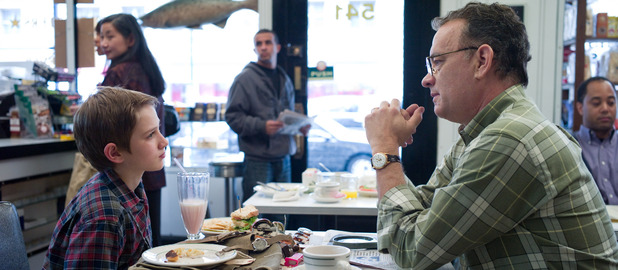
In books and in films acts of inhumanity are often best viewed through a child’s eyes, enabling the blunt expression of otherwise unspeakable cruelty. This meditation on 9/11 from director Stephen Daldry (based on a novel by Jonathan Safran Froer) makes use of that device and goes even further by suggesting that our young hero is on the autistic spectrum.
But the harsh truth is that Billy Elliot helmer Daldry (three times Oscar-nominated and, perhaps, too keen for another shot) lays it on a bit thick. The saving grace is newcomer Thomas Horn who as 9-year-old Oskar has not a shred of self-consciousness, marching through the film with a matter-of-factness that helps to sap a lot of the saccharine from an overcooked plot.
Skipping back and forth in time it’s revealed that Oskar’s doting father Thomas Schell (a safely cast Tom Hanks) perished in the attacks on the World Trade Centre. None of it makes any sense to Oskar, but the anguish is amplified because he has a pathological need for order and tidiness. When he finds a mysterious key in dad’s wardrobe he hopes it will open the way to a resolution.
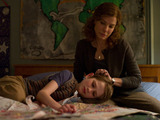
So begins a round-the-houses tour of New York City, an extremely loud and scary place for such a nervous boy. But the people he meets are mostly friendly, like The Help‘s Viola Davis who is also grieving a loss. The intensity of the situation is tempered by Oskar’s frank questioning, but these moments of humour – instead of enlightening – can feel like a ploy to avoid stark reality.
Oskar only buttons up around his mum, who is astutely played by Sandra Bullock, seeming brittle at times though her love is never in doubt. Their scenes together are the most affecting, especially when Oskar does lash out, cutting her with remarks that expose her vulnerability. By contrast, flashbacks to the good old days with dad feel insincere because Oskar refuses to see any flaws.
Another father figure presents himself in the shape of grandma’s lodger (Max von Sydow), who offers to assist Oskar in his hunt for the lock that fits the key. The metaphor weighs heavy as it’s clear the old man is hiding something and – in one of many quirks – he’s mute as well. Still, their growing bond gives the film a stronger sense of direction just as the energy is beginning to flag.
This is an engaging journey, but it’s also long and unevenly paved and the biggest bumps in the road come towards the end. Oskar reveals a fixation on the photo of ‘the falling man’ (the subject of much speculation in the aftermath of 9/11) and though this may have been effective as a reference on the page, it feels exploitative when shown in close-up on the big screen.
At the close Oskar must naturally accept that life is random and untidy, and yet again this is undermined by the tying of all loose ends in a bow. The comforting feeling that he was loved – and is loved – is reaffirmed in grand gestures that really aren’t necessary and certainly aren’t realistic. Only the hardest of hearts could be unmoved, but that’s all the more reason to pull back just a little.

…………..
The Vow
By Simon Reynolds
Rachel McAdams and Channing Tatum know a thing or two about big movie romances having scored box office hits with Nicolas Sparks swooners The Notebook and Dear John, so putting them together in time for Valentine’s Day seems like an obvious hook-up. The term “no-brainer” could be used, but that seems a tad inappropriate considering the subject matter of Michael Sucsy’s romantic drama, which takes inspiration from real-life couple Kim and Krickitt Carpenter.
McAdams and Tatum play Paige and Leo (she’s an artist, he owns a recording studio), a happily-married couple whose world is turned upside down when a car accident leaves her with a brain injury and no memory of their life together.
Paige finds Leo in one corner trying to make him fall in love with her all over again, while in the other her estranged parents (Sam Neill and Jessica Lange) see it as an opportunity to re-connect with their daughter and put right the wrongs of the past. In this push-and-pull between family and her husband, Paige finds herself shifting away from the bohemian lifestyle and back to the people she abandoned years earlier. Her last memories are from a time when she was studying to be a lawyer and engaged to high-flier Jeremy (Scott Speedman).

Romantic dramas tend to live or die by the chemistry between their two leads, and The Vow finds McAdams and Tatum striking up a believable on-screen bond – both as a married couple and two people desperately trying to find a road back to where they were.
A date involving chocolate roulette and a dip in a freezing Chicago lake provide some sweet moments, with the courtship playing out over an of-the-moment indie pop soundtrack. However, Paige’s comfort in familiarity and her growing doubts about having a future with Leo lends the story some dramatic tension.
The solid performances and investment in the lead characters’ plight holds attention for a while, but The Vow‘s central hook is never quite explored to its full potential. The story, from Abby Kohn, Marc Silverstein and Sucsy, merely uses the conceit as a transparent device to power the plot.
It feels more like an easy gimmick and results in the movie having a slight, soapy feel. Furthermore, Paige’s parents are criminally underwritten, coming across as two-dimensional obstacles rather than rounded people. This, despite the best efforts from the esteemed Neil and Lange.
The Vow is something of a feather-light memory-loss melodrama that’s made watchable by committed turns from its two leads. McAdams and Tatum are well-trained when it comes to this type of thing, yet despite their appeal and the brain trauma plot hook, it can’t quite break away from the soppy cliches inherent in the story. Paige’s memory may be sketchy, but audiences will definitely recall seeing this kind of movie before.


